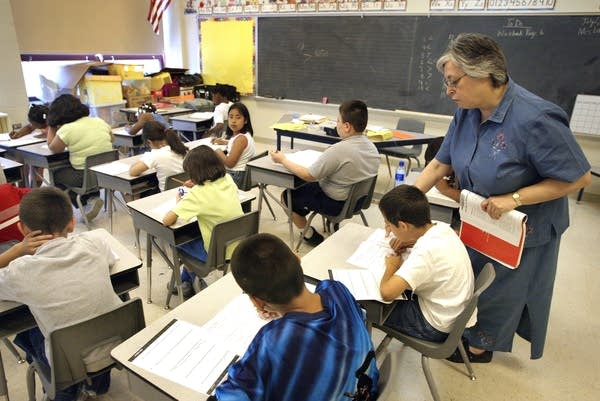Combating cheating in elementary school
Go Deeper.
Create an account or log in to save stories.
Like this?
Thanks for liking this story! We have added it to a list of your favorite stories.

As schools continue to find new ways to combat student cheating, researchers are finding that the habit develops in elementary school.
"About 30% of elementary students report cheating when asked on anonymous surveys, according to a seminal 1999 research review that is still cited by researchers and administrators," wrote Sue Shellenbarger in the Wall Street Journal.
By high school, more than half of students surveyed admit to cheating on tests and nearly three-fourths have copied homework answers from a fellow student.
More from The Wall Street Journal:
Turn Up Your Support
MPR News helps you turn down the noise and build shared understanding. Turn up your support for this public resource and keep trusted journalism accessible to all.
First- and second-graders are often taught to work together and share ideas in small classroom groups. When told they must start working independently, "it's naturally confusing to a 7-year-old," Dr. Anderman says.
By third grade, "the high pressure starts" as more students begin taking state standardized tests, says Mark Terry, president of the National Association of Elementary School Principals. Most schools also begin giving grades, and children may cheat to keep up or to please parents or teachers. Children with poor study skills or learning disabilities are especially vulnerable; poor impulse control is linked with a higher readiness to cheat, says a 2010 study of 189 children in the Journal of Clinical Child & Adolescent Psychology.
Tricia Bertram Gallant, past chair and member of the International Center for Academic Integrity Advisory Council, said no one should be surprised by the growing cheating epidemic. She says we are all to blame:
The educational ethics scandals all over the country (e.g., at Harvard, Stuyvesant High School, Penn State) must convince us that it is a fallacy, and a harmful one at that, to insist that ethics and integrity have no place in our educational curricula. We should not believe that we can teach students to be scientists, engineers, accountants, lawyers, coaches, and other professionals without teaching them about professional integrity and ethics. We cannot just expect that students should "know better" because clearly some do not. And we are naive to believe that all parents can teach their children ethical decision reasoning, making or behavioral skills; after all, it is likely no one taught the parents either.
LEARN MORE ABOUT CHEATING IN SCHOOL:
• Keep kids from cheating in school
"The best way to keep your child from joining in? Start now — in the elementary years before cheating becomes truly widespread. 'You want to get good behavioral habits established while moral reasoning is developing and deepening,' says Thomas Lickona, Ph.D., author of 'Raising Good Children and Character Matters — How to Help Our Children Develop Good Judgment, Integrity, and Other Essential Virtues.' 'There's research to suggest that even young children are more sophisticated and morally observant than we might give them credit for.'"(Parenting)
• Education's cheating epidemic
"Cheating needs to be addressed as part of a cultural problem. It is up to us to make it unacceptable not only in schools but also throughout society. Every time we accept it as unavoidable or tolerable, we help ensure that the culture of cheating is passed on to the next generation." (LA Times)





